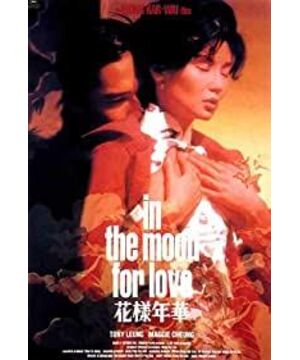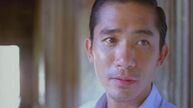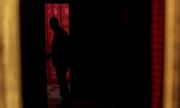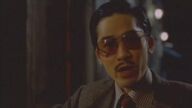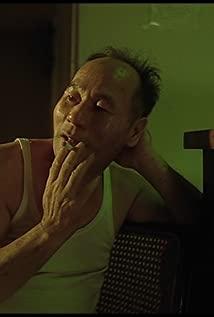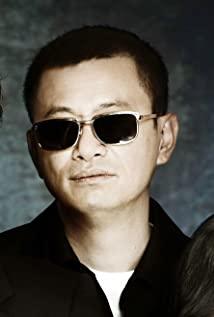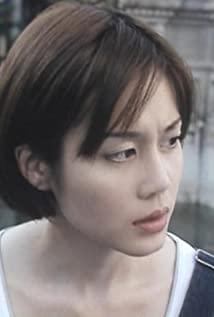(1) Memories without memories
At the end of "In the Mood for Love", Zhou Muyun, played by Tony Leung, came to Angkor Wat, as people say, if there is any secret that you don't want to be known. I said it to the tree hole, and then sealed it in, and then a series of empty shots showed the architectural space of Angkor Wat. In the Buddhist meaning, everything has no going or coming, so this relationship will not disappear; at the same time , Cambodia has become a special space because of its history and geography. Western film critics have keenly discovered the hidden political symbols of the film, such as the identity of Shanghainese who came to Hong Kong, and the news broadcast of Cambodia welcoming Charles de Gaulle, which implies that Wong Kar-wai is not Only obsessed with the micro and personal relationship between men and women, but hides a larger symbolic world - the story of Zhou Muyun and Su Lizhen is a fable of Hong Kong Island in the 20th century. The film was filmed around 1998-1999 and released in 2000 Years, and since then, this ill-fated city has sealed its history.
It is an impure history, and Hong Kong is also an impure city. We can refer to the Baroque style of European directors such as Kieslowski and Almodovar and call "In the Mood for Love" "Oriental Baroque". It's a compound word, and in the film's ideographic system, Chinese-style music, drama, and even Cantonese pop songs give way to Quizas, Quizas, Quizas, the Spanish-language Tango, which becomes a memory space that appeals to hearing, rather than " Baroque aesthetics” is a direct presentation of the composition. In the first half of the film, the foreground is blocked in various ways, and the image in the mirror is split. Su Lizhen is a mysterious woman who never shows her face in a positive way. The collective identity of Hong Kong under the mezzanine, there is no history here, most people are refugees from Shanghai who have passed away, trying to summon the golden age of the past in the space that has been commercialized, and this lack of history just constitutes the history of Hong Kong recall.
(2) Dead time crystals
In these foreground occlusions, clocks are one of the common elements, in the film time is a crystal, crystal means uncertainty, it is solid, so there is no way to flow, it dissipates the moment it is picked up, Like the smoke that floats straight up in Zhou Muyun's hand, when it enters our perception, it has already died.
More precisely, "In the Mood for Love" and Wong Kar-wai's other works can be called "state movies", which do not directly deliver the film to the pure flow of time, but suggest the film's demise through "emotion". Time It is a physiological response of a series of intensity properties such as muscle, heart rate, and skin, which precedes our intentional empathy for Zhou Muyun or Su Lizhen.
Usually in solid images, the first is a fixed structure (in suspense films, the breaking of the fixed structure is the end of the narrative), and different states are different aspects of the structure, but in "In the Mood for Love", Su Lizhen and Zhou Muyun There are two variables, and what supports this variable is some kind of accidental life impulse, and there is no other connection. In addition, in this change, a certain dream operation logic cancels the waking state, and to a certain extent. The continuation of the previous one needs to destroy the structure of the former, just like in the film, Su Lizhen wears a cheongsam with various colors, maybe in the next shot that should be "continuous", what Wang Jiawei is wearing becomes another one. way, suggesting that the fascination with the film’s linear narrative is nothing but false wishful thinking.
In the first half of "In the Mood for Love", Su Lizhen's love for Su Lizhen came from a harlequin character, A Bing. His appearance actually implied a kind of free space. In his dialogue with Zhou Muyun, Zhou Muyun actually presented Zhou Muyun Obscene imagination in the true sense, but at the same time, Zhou Muyun's response to his vulgar words was "but he has a husband", Zhou Muyun must deny him, or Wang Jiawei must let Zhou Muyun deny him, because morally "correct" "It makes it more "safe" for the viewer to imagine Zhou Muyun's sexual fantasies, but because of its apparent purity, it is free from the repression of the superego. In other words, secret love is the most obscene act of rape, because only at this stage, we It is possible to have the most obscene imagination without punishment.
Next, A Bing's exit came from the absence of the structure created by the two opposing scenes, and they appeared in the same space: in the restaurant. For the first time, Zhou Muyun asked Su Lizhen out and asked where she bought her handbag. , he was going to buy it for his wife as a birthday present, Su Lizhen told her that she couldn't buy it in Hong Kong, and then asked Zhou Muyun about the tie on his body, in this scene, then, we learned that Zhou Muyun's wife had the same hand-held tie Bao, Su Lizhen's husband also has the same tie, and the object once again becomes a reflexive, hidden medium, a metaphor for the body. The fact that the alternative signifiers are replaced, Zhou Muyun can be Su Lizhen's husband, Su Lizhen can be Zhou Muyun's wife, this misidentification opens the second restaurant rivalry: Su Lizhen asks Zhou Muyun, "I want to know what your wife likes to eat?" Zhou Muyun She didn't answer, but instead asked her husband what he liked to eat. The misidentification was followed by "enhancing", and this "enhancing" came to an abrupt end after Zhou Muyun's wife discovered her husband's cheating behavior, and the structure of the misidentification was broken.
A Bing's reappearance is indirect. In Zhou Muyun's narration, we learn that he invited Zhou Muyun to Singapore, and by doing so prompted Zhou Muyun and Su Lizhen to meet again and again for the last time, so we can be more certain that this is not very good-looking. The person in question is Zhou Muyun wearing a mask. By retaining this love, he chose to exile himself, and the most famous line in "In the Mood for Love" was born: If there is one more ticket, will you take me with you? However, we might as well think about it from a different angle: why can there be only one ticket?
(3) Who narrates the film?
In the crystallized "state movie", Hong Kong transcends the regional identity, but is the incarnation of the emotional body. When Zhou Muyun was about to leave Su Lizhen, accompanied by the music of Quizas Quizas Quizas, he stood still in the corridor, the corridor The red hue of the burning desire is also the color of the rose on Su Lizhen’s cheongsam. Entering the room from this corridor is entering Su Lizhen’s body, while the ritualized departure is the moment of the sage after the pleasure is over. , Next, this embodied corridor appeared again as an empty lens, inserted into the two shots of Su Lizhen, who were alone, from far to near. "If you have an extra ferry ticket, will you take me with you?" Zhou Muyun internalized in her, while Su Lizhen was a ghost to Zhou Muyun, the ghost on the other end of the phone.
When we question this subjective reconstruction, we inevitably encounter a classic proposition of film narratology - who tells the film?
When Zhou Muyun told the secret to the entrance of the cave, the camera focused behind him, the back of a little monk. As commentators, we found our innocent self here, and when we, as viewers, were in Plato's cave-like cinema Among them, it is difficult to recognize him, nor can he identify the narrative that collapsed at this moment as fiction, just like the baby facing the mirror for the first time in Lacan's mirror theory. At that moment, he did not know what was in front of him. This person is himself. Here, we re-write the Buddhist verses through commentary words and psychoanalytic theories - not wind movement, not sail movement, but actually heart movement, or in other words: emotion movement.
references:
Olivier Assayas, etc.: "Reading Poets in the Bar", selected by Tan Xiaohan, Henan University Press
Slavoj Žižek: "Squinting Eyes", translated by Ji Guangmao, Zhejiang University Press
Slavoj Zizek: The Art Of Ridiculous Sublime, University of Washington Press
Brain Massumi: Parables for the Virtual, Duke University Press Books
View more about In the Mood for Love reviews


